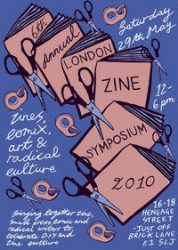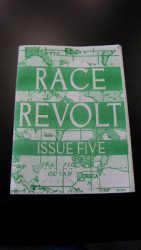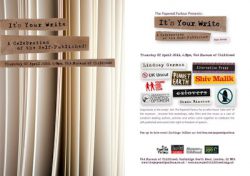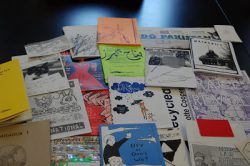
Lincoln Zine Fest donation
We all know that Valentine’s Day is a construction, a form of artifice which consigns love and romance, with its contingent successes and failures, to a random moment in time.
Exploring our most recent and a generous donation of zines from Lincoln Zine Fest, Tavian Hunter, Iniva’s Library and Archive Manager writes about the vast range of topics that focusing on the diffuse nature of relationships which offer honest personal accounts and coping strategies.
The zines also provide a useful set of questions about forming relationships, understanding your sexuality and the need for support structures that may be non-traditional.
Queer Sailor Moon Fanfiction saved my life (QSMFF) by Lily P.
This is a perzine by Ottawa-based zine writer Lily P. Lily writes a personal pre-teen account of immersing themselves in queer fandom as an act of comfort, copying with childhood trauma and fun escapism.

They write about their love of the Japanese manga series Sailor Moon’s Haruka (Sailor Uranus) and Michiru (Sailor Neptune) happy queer relationship and the supportive queer family love in the televised show adaptation. Extracts of fanfiction about Spice Girls are also featured with members Emma and Geri kissing.

Queer Sailor Moon Fanfiction Saved My Life
It is a raw and witty zine about self-care and finding copy strategies for dealing with trauma, suicide, abuse, loneliness, puberty, homophobia, racism and privilege while not being ashamed of loving pop culture.
(re)bound(ary) : a zine about processing and relationships by Jade Mars
Jade Mars (pronoun ze) is a self-proclaimed white genderqueer femme, writer and anarcha-feminist witch. Ze writes a collection of affirmations for developing and maintaining personally set boundaries and reminders to oneself.
It is written to process Jade’s past, current and new relationships. It is also a vital experience for healing and addressing mental health and increasing feelings of psychological growth. It is a powerful resource in navigating queer intimacy and relationships.

Versions of Violence: Queer Women and Femmes on Heterosexism compiled by Kirsty
This zine features 13 different queer women and femme non-binary people.
It details their written experiences of how gender interacts with experiences of microaggressions, heterosexism and homophobia. It also includes topics of family relations, fetishisation, genderqueer terminology, sexuality within religion, autism and sexuality and heterosexism in healthcare.
Another zine by Kirsty already in the collection is ‘Poly/Not Poly: adventures in relationship structure ambivalence’.
Support Zine by Cindy Crabb
In the time of #MeToo, there is an increase in reporting sexual assault and abuse.
Cindy Crabb brings us a zine to support people have been sexually abused and document ways those who have not experienced sexual violence can be supportive.
It features a definition on consent; letters of support Cindy has received; the different needs of those abused and safe sex for survivors. It also gives triggering visuals depicting feelings of denial, fear and safety through comics by Fly and resources for further reading.
I Don’t Want To Be Your Lobster (IDWTBYL) by Derek Adams; Odette Brady; Jenna Clarke; Emily Cooper; Livia Franchini; Charlotte Heather; Rachel Hiley; Victoria Manifold.
IDWTBYL is an inclusive platform for people to creatively discuss the vast spectrum of sexual experiences and sexuality.
This first issue covers topics on BDSM, essays on sex in contemporary fiction, pubic hair and the body, imaginary boyfriends, fetishes with sexual imagery and illustrations from nine contributors.

Someday you will ache like I ache
Someday You Will Ache Like I Ache: A Zine About Internalized Sexism By Joan Elizabeth
Joan Elizabeth is a white ciswoman who identifies as queer. In this zine, she reflects on her history of mostly dating men and broad societal constructions such as patriarchal culture, white privilege and internalized sexism.
It starts off with an excellent quote on internalised sexism from Bell Hooks’ book Feminism is for Everybody: Passionate Politics. Then it moves into an honest and painful personal story about Joan’s problematic relationship with her (ex-) boyfriend. Her writings offer not only her stories of relationship with men but thoughts of identity construction and sociological human behaviour.

Damage: a perzine
Damage: a perzine by Anonymous
Damage was first launched as part of Queer Zine Fest in 2013. It details the personal story of the author in four thematic parts, which include: suffering and treatment of a broken heart; depression and low self-esteem; breasts and masculinity and comfortable embodiment.
This reprint edition made in 2015 also includes the author’s own reflections on their weight and the emotions associated with the process of weight loss.
Hijab by Alain Badiou
Unlike the other zines, Hijab is a re-publication of 32 paragraphs from Alain Badiou essay on the French law on the headscarf, originally published in his book Polemics. Badiou treats the law on the hijab as a symptom of a purely capitalist system that veils the fear of others lifestyles. This zine is a philosophical read that looks at forced exposure of femininity as Badiou maintains that the emancipatory ban on headscarves is more about French commerce than faith.
This zine complements the publication ‘Veil: Veiling, Representation and Contemporary Art’ which addresses notions of the veil and provides social and historic context to the veil’s multilayered symbolism in contemporary arts practice.

These zines are a welcome addition to our zine collection and expand our reading lists dedicated to the themes of Self-care and More-than-Human care. This includes selected text that looks at physical, ecological, emotional and mental well-being through the lens of race, class, gender and other intersectional thought, in order to develop critical discussion around art, activism and self-care.

These zines also add to questions on sexual identities and intimate relationships explored through our emotional learning cards resource, ‘What do relationships mean to you?‘. These cards use contemporary art to support reflection on key themes ranging from what makes a relationship meaningful, emotionally enriching and sustainable through to how we articulate sexual difference and alternative sexualities.










